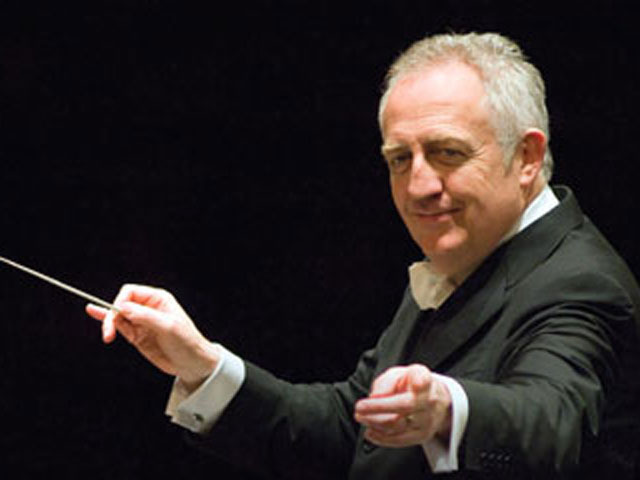
The master at work...
Chris Thomas: I’d like to turn to your own music for brass band and in particular the test piece you wrote for the British Open in 2005, ‘The Night to Sing’.
What was it that drew you to the subject of VE Day and the elements of humanity that inhabit the work?
Bramwell Tovey: I’d been reading ‘London 1945’ by Maureen Waller, which focused on how Britain coped with the aftermath of World War 2.
VE Day (Victory in Europe day, May 8th, 1945) turned into a huge party all across the UK.
That evening, a woman was quoted as saying “This is the night to sing!”
A day or two later I happened upon Betjeman’s eloquent memorial to a friend, which included the lines “Stop, oh many bells, stop” and from those two literary sources, the whole piece came together very quickly.
It’s dedicated to my mother who spent a lot of the war in an air raid shelter with my sister, Elisabeth.
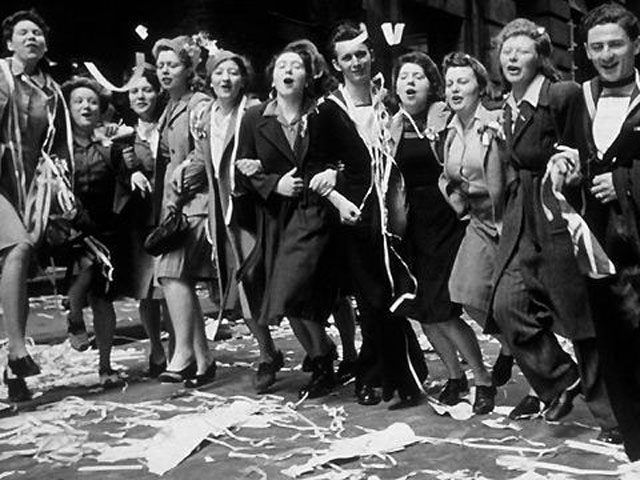
Musical inspiration: VE Day 1945
Chris Thomas: Upon hearing the piece for the first time, I remember being struck by the fact that although technically challenging, you had first and foremost written a piece of music and not simply a test.
Knowing that it would need to test the very best of bands, how did you approach writing the work?
Bramwell Tovey: I had about 6 months to write it, although of course, there were the usual conducting engagements going on at the same time.
I wanted to write a piece that would challenge every single player in the band and at the same time, be a new kind of challenge for the conductor.
It is very difficult indeed, but as we proved at the NYBBGB on my first course, young musicians had no problems with the musical and technical difficulties.
Within weeks, John Pickard’s wonderful ‘Eden’ was played at the Royal Albert Hall and is now regarded as much more difficult.
As for the musical side of it (always the most important thing for me) the legendary conga, danced around Piccadilly Circus provided a launching point.
The central 'Adagio' is entirely concerned with the emotions raised in Betjeman’s poem.
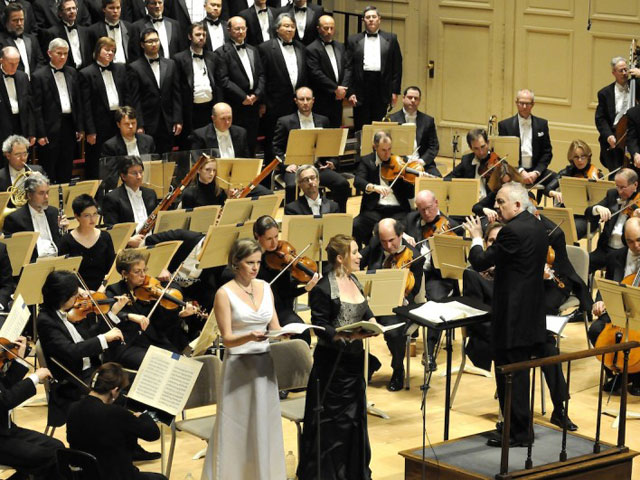
Directing the chroal massed ranks...
Chris Thomas: ‘The Night to Sing’ is not the first time you have turned to war as a theme in your music.
Your ‘Requiem for a Charred Skull’ for chorus and brass band that won Juno award in 2003 was inspired by events in Kosovo?
Bramwell Tovey: During the war in the former republic of Yugoslavia, there had been distressing reports of an atrocity in Kosovo.
Soldiers had been trapped inside a farmhouse, which was deliberately set on fire. A machine gun was trained on the exit door.
After the carnage one victim’s skull was decapitated and placed on a windowsill as a kind of trophy.
'Requiem for a Charred Skull' was my own small way of commemorating the incident.
Chris Thomas: Your earliest significant work for brass band however was ‘Coventry Variations’, commissioned back in 1986 during your association with the GUS Band.
Again war is a theme, this time Coventry’s rise from the ashes of its destruction in the blitz.
Your decision to base your variations on the 'Coventry Carol' clearly gave your musical imagination tremendous range?
Bramwell Tovey: Starting with the carol in a very naked setting and thinking about the words, particularly the story of Herod and the slaying of the children, this was the first major brass band piece that I’d written that saw the light of day.
It was premiered by GUS Band at the Derngate in Northampton in December 1986.
The central 'adagio' was conceived at the same time but took years to get finished due to the pressure of the rest of my life.
Peter Wilson of Rosehill Music invited me to lunch around 1999 but told me not to bother to come if I hadn’t finished it.
It was not my intention to write three ‘wartime’ works for brass band; it just happened that way.
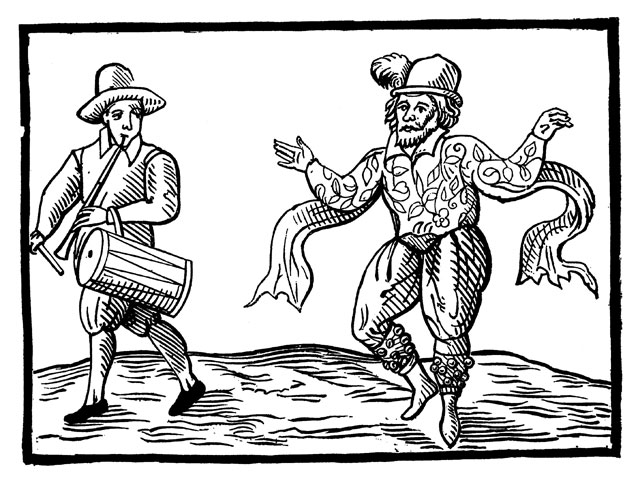
Nine days to Norwich for Master Will Kemp
Chris Thomas: In Canada you have worked extensively with the Hannaford Street Silver Band for whom you wrote ‘Nine Daies Wonder’, a work that is in effect a concerto for violin and brass band.
Given the unusual nature of the instrumentation, can you tell us a little about the work’s inspiration and conception?
Bramwell Tovey: As a boy I’d played and marched in open-air services with the YP Band along Ilford High Road.
In 1604, this old Roman road had seen the famous London to Norwich jig danced by Will Kemp, the Shakespearean actor/comedian who had worked with Shakespeare himself at the Globe Theatre.
I’d heard about Kemp’s famous story at school, how he danced from London to Norwich in nine days.
When Mark Fewer and Hannaford asked for a piece it seemed a good subject given Mark’s histrionic talents.
“A violin concerto with brass band?” was most people’s astonished reaction. Nonetheless, the violin does not require amplification and it’s worked really well in live performance.
Hannaford’s longtime administrator and founder, Ray Tizzard, is one of the most important banding figures in North America.
He has commissioned so much new music, trained young players in their youth band, all while playing the trumpet professionally in the Canadian Opera Company.
If Ray hadn’t decided to call me up on a whim in the early 1990s, I might well have lost contact with bands altogether.
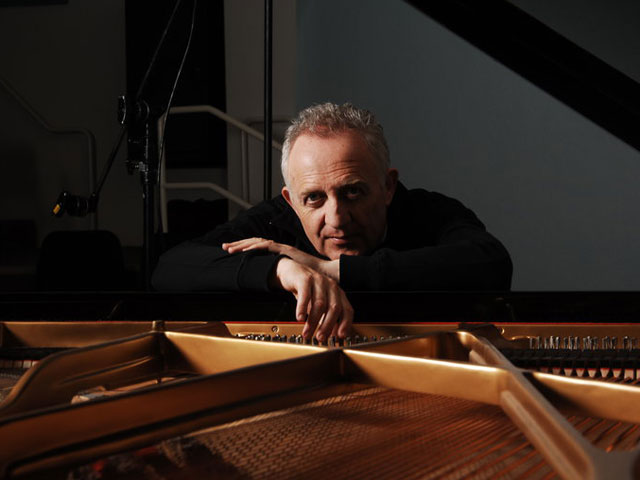
Jazz inspired at the piano
Chris Thomas: Jazz also surfaces regularly in your music.
I‘m thinking of a piece such as ‘Pictures in the Smoke’ where jazz is a crucial part of the creative concept.
Jazz is an idiom that you clearly empathize with both as composer and pianist?
Bramwell Tovey: Jazz is so liberating, as is any kind of improvisation.
'Pictures in the Smoke' is all notated, although in the solo part I sometimes deviate from the printed score.
There are two versions: the original for brass band and percussion and the subsequent arrangement for orchestral brass and percussion.
This piece was written in a very short period of time and premiered at the RNCM. Fodens only got to rehearse it the night before.
The plan was to write a piece that could be led from the piano. Later on, I discovered Fodens had asked Gary Cutt to hang around, as they didn’t think it would work without a separate conductor.
When I played it with NYBBGB, the band was too big to direct from the piano, so Simon Dobson conducted.
Otherwise, I’ve always conducted it from the piano.
Chris Thomas: You have conducted a good deal of the band repertoire over the years but looking back, what are the works that have meant the most to you on a personal level over the years and for what reasons?
Bramwell Tovey: The SA repertoire is obviously a major part of my banding personality: Condon’s ‘Call of the Righteous’ and his ‘Celebration’ are favourites.
Also Ball’s ‘Journey Into Freedom’ which I heard in 1967 at the Royal Albert Hall when Geoffrey Brand won with Black Dyke, one of the greatest performances I ever heard of anything, at least, that’s how I remember it.
That was also the only occasion when I attended the Nationals with my Dad who died in 1968.
Steadman Allen’s ‘Holy War', Goffin’s ‘My Strength, My Tower', all those great post-war SA classics.
But I also enjoyed Birtwistle’s ‘Grimethorpe Aria’ (I love conducting his music), Simpson’s ‘Energy', and anything by Wilfred Heaton, who I had the privilege of meeting at his Harrogate apartment in the early 1990s.
The list grows every week and includes the usual suspects like Wilby, Graham, Bourgeois and so on.
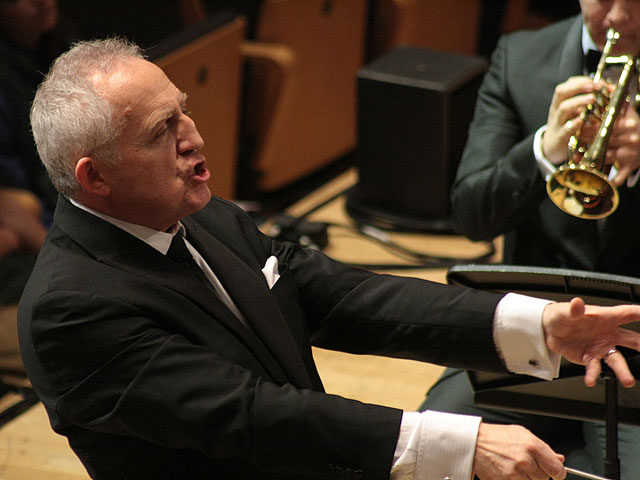
Familiar pose: In command of a brass band
Chris Thomas: Your involvement with the National Youth Band of Great Britain is obviously something that you care deeply about.
Could you tell us a little about your experiences with the NYBBGB and what makes it is so important and rewarding for you?
Bramwell Tovey: Elgar Howarth was one of my musical heroes. I’d been over to his house to talk about bands back in the early 1970s, when I was looking for repertoire ideas for Hanwell.
When Gary decided to retire from the NYBBGB, Philip Biggs approached me on behalf of the council, but I turned the job down.
My wife and I thought that with two orchestras, a blossoming composing career and three children, then aged from six to sixteen, this could be the straw that might just break the camel’s back.
I’d always enjoyed working with Fodens but just didn’t seem to have any space for anything else.
I reckoned without the persistence of Philip Biggs.
He just wouldn’t take no for an answer. I had always admired Philip, whom I first got to know as a friend of Richard Franklin, the secretary and flugel player at GUS/Rigid in the 1980s.
After yet another lunch with Philip I realized that I’d be very lucky indeed to work with both him and the band.
Well, that’s turned out to be a massive understatement.
On the rare occasions when I’ve missed a course (that’s only happened three times in seven years) I have terrible guilt and pangs of remorse.
The privilege of working with these young people is very intimidating.
To witness so many young lives grow and mature, whether musically or otherwise, and see so many young people treasure the band as the cultural focus of their lives, is a great honour.
I’ve also seen dozens of wonderful musical talents emerge through the ranks, from James Fountain and Paul Duffy to Matthew White and Zoe Hancock and many more.
It is such a privilege to be part of the early career of such musicians.
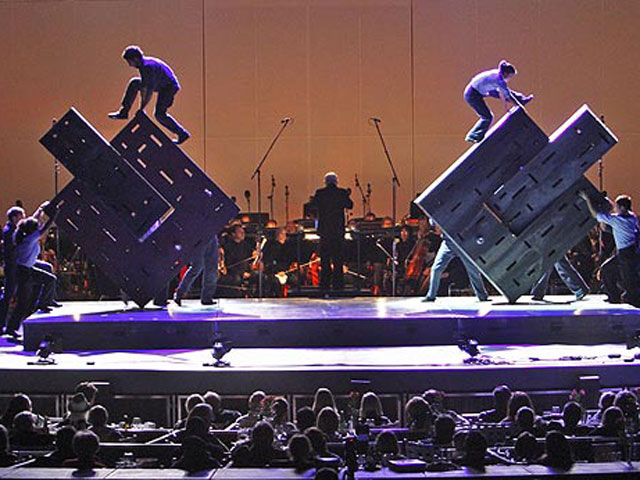
Engaging talent and youth is so important
Chris Thomas: On the whole, do you feel that we encourage talent amongst our youth sufficiently and do we have an adequate infrastructure in place do so?
If not, what do you feel can be done to bring about change that has the potential to make a meaningful difference in the future?
Bramwell Tovey: It’s difficult to imagine that the encouragement of young people could ever be called ‘sufficient’.
Sometimes, it’s just necessary to stick your neck out and say what needs to be said, even if Luddites throw brickbats at you - as happened to me last year.
One of the most exciting recent developments has been the number of top bands that have started a youth band.
Undoubtedly, the NYBBGB’s decision to form the National Children’s Band has had a hugely positive effect on the older group. As a system, it would seem to have nothing but advantages.
One of the best events in the banding calendar is the RNCM annual Festival of Brass under the stewardship of Paul Hindmarsh.
Because of Paul’s eclectic tastes and encyclopedic knowledge of both the traditional banding repertoire and the very latest composing talents, this weekend has become the most significant UK event for new brass band music.
It’s unfortunate that there is no accepted organization that represents brass bands as a movement.
Of course, such things take time and money, and as the recent registration crisis showed, passions get inflamed. As in so many areas of life, everyone has an opinion.
Only someone with the combined qualities of Solomon, Henry Kissinger and Mother Theresa would be able to speak for the movement as a whole.
Chances are, that person is too busy running a Fortune 500 company.
It’s like contesting. If you put half a dozen banders together, you get a dozen viewpoints.
But if there was a truly representative organization that embraced the differences within the movement and where lower sections, youth and non-contesting bands could enjoy proper representation, as much as the top championship section bands, then at least a public spokesperson might be found who could represent the movement to the rest of the musical world.
There are so many great people involved in banding.
Scottish bands are moving ahead in this regard. I spent a few days last August, working with the three NYBBS bands and was very impressed with the organization of the whole scene up there.
I’m sure the European Championships in Scotland in 2014 will be a big success.
On a slightly unrelated topic, I would love to see a more diverse representation of ethnic backgrounds in the brass band world.
At the recent NYBBGB course it was such a pleasure to meet Beth Gallagher.
A member of the house staff who plays the tenor horn, Beth has been closely involved with Trinidadian steel drumming.
Just imagine the healthy future of the movement if we could absorb these influences in the same way as the orchestral world.
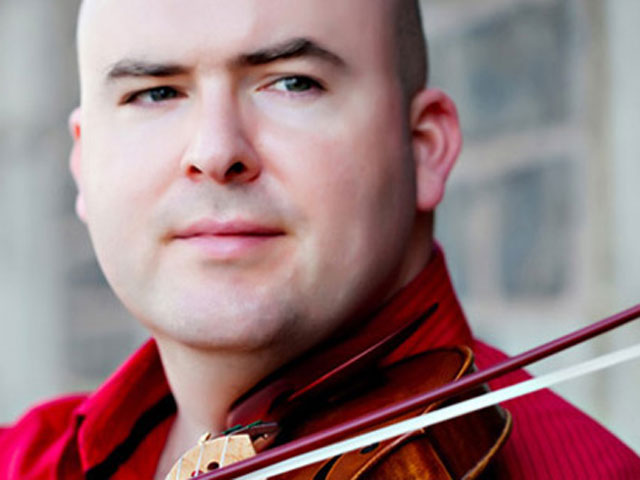
The partnership with violinist Mark Fewer was a huge critical success
Chris Thomas: Funding for music in schools is sadly being eroded away yet further as we speak, a point that I suspect you have strong feelings about?
Bramwell Tovey: For sure. Music is a language that enables communication between human beings.
Being in a musical ensemble, whether brass, jazz or wind band, orchestra or choir, is a life-enhancing cultural expression. It’s also about building self-esteem and performing as part of a team.
If a child is holding a musical instrument, then he or she cannot hold a cigarette, a knife, a joint, a needle or a gun.
In Vancouver, a specialized arts school decided to close down its school orchestra - the only one in the Vancouver school district.
I went along to a public meeting and made myself extremely unpopular with the administration, though with the full support of the parents. Collectively, we managed to save the orchestra, but only after a great carry-on.
This is happening more and more in Britain. Dismantling the wonderful music education programs across the country would be a dreadful mistake.
They are investments in the social fabric of society.
At the VSO, I’m also Artistic Adviser of the Vancouver Symphony Orchestra School of Music, the only music school in North America run by a major symphony orchestra.
We’re very proud of the VSO’s extensive education work.
In combination with the position at NYBBGB, this has obliged me to speak out about music education issues in Canada and from time to time, in the UK as well.
Aside from that, all three of my kids have played musical instruments to a high level, been in bands and orchestras and sung in choirs in both the UK and Canada.
As a parent, it’s important to speak out. As a musician/parent, it’s essential if you want to sleep at night.
Bramwell Tovey interview:
Part 1: http://www.4barsrest.com/articles/2013/1397.asp#.UfTBfI1OR8E













